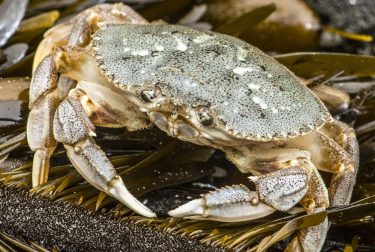
The ocean acidification expected as seawater absorbs increasing amounts of carbon dioxide from the atmosphere will reverberate through the West Coast’s marine food web, but not necessarily in the ways you might expect, new research shows.
Dungeness crabs, for example, will likely suffer as their food sources decline. Dungeness crab fisheries, valued at about $220 million annually, may face a strong downturn over the next 50 years, according to research published today in the journal Global Change Biology. But pteropods and copepods, tiny marine organisms with shells that are vulnerable to acidification, will likely experience only a slight overall decline because they are prolific enough to offset much of the impact, the study found.
Marine mammals and seabirds are less likely to be affected by ocean acidification, the study found.
“This was basically a vulnerability assessment to sharpen our view of where the effects are likely to be the greatest and what we should be most concerned about in terms of how the system will respond,” said Tim Essington, a UW professor of aquatic and fishery sciences and a co-author of the research.
Read more at UW Today »
